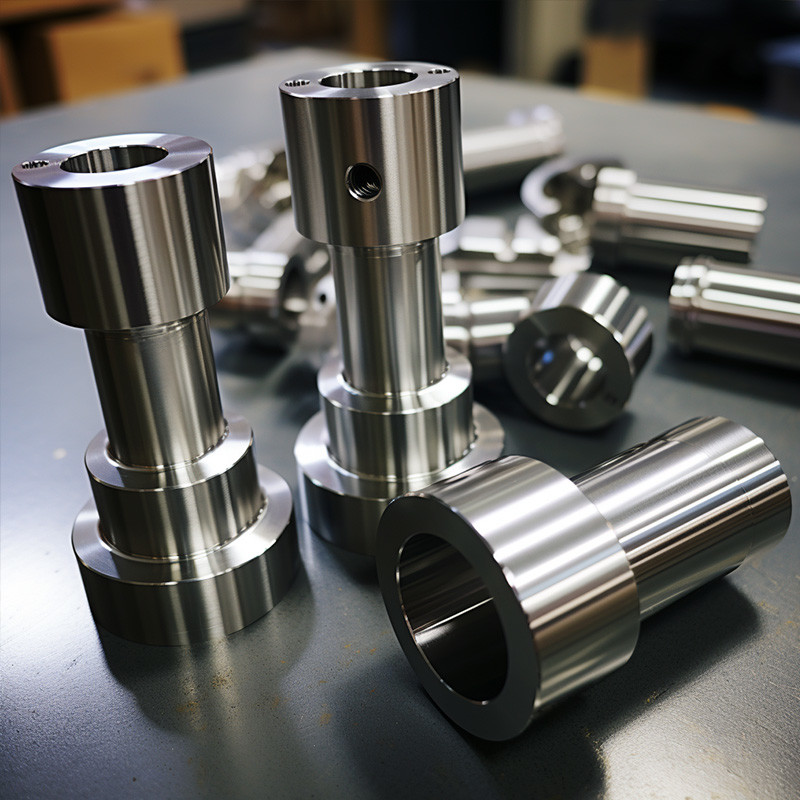Dongguan Yexin Intelligent Technology Co., Ltd. |
|
Verified Suppliers
|
|
CNC turning is a manufacturing process that involves securing a blank on a rotating chuck
and using stationary cutting tools to remove material.
This method is particularly suitable for creating parts with symmetrical features along their central
axis. Turned components are usually manufactured more efficiently and cost-effectively compared
to milled parts.
Product Details
Materials Suitable for CNC Turning
CNC turning is a versatile machining process that can effectively
work with various materials.
These materials include metals like aluminum, steel, brass, and titanium, as well as plastics
such as acrylic, nylon, and polycarbonate.
| Common Materials | |
| Name | Description |
| Aluminum | High machinability and ductility, good strength-to-weight ratio. |
| Stainless steel | High tensile strength, corrosion and temperature resistant. |
| Mild steel | High machinability and weldability, high stiffness. |
| Brass | Low friction, excellent electrical conductivity, golden appearance. |
| Copper | Excellent thermal and electrical conductivity. |
| Titanium | Excellent strength to weight ratio, used in aerospace, automotive and medical industries. |
| POM | High stiffness, high accuracy, low friction, easy to machine. |
| ABS | Common thermoplastic, impact resistant, easy to machine. |
| Nylon | Excellent mechanical properties, thermal, chemical and abrasion resistant. |



| CNC Turning Tolerances | ||
| Limits for nominal size | Plastics | Metals |
| 0.5mm* to 3mm | ±0.1mm | ±0.05mm |
| Over 3mm to 6mm | ±0.1mm | ±0.05mm |
| Over 6mm to 30mm | ±0.2mm | ±0.10mm |
| Over 30mm to 120mm | ±0.3mm | ±0.15mm |
| Over 120mm to 400mm | ±0.5mm | ±0.20mm |
| Over 400mm to 1000mm | ±0.8mm | ±0.30mm |
| Over 1000mm to 2000mm | ±1.2mm | ±0.50mm |
| Over 2000mm to 4000mm | ±2.0mm | |
| *Please clearly indicate tolerances for nominal sizes below 0.5mm on your technical drawing. | ||
Typical Applications of CNC Turning
Turning is employed in the fabrication of rotational, predominantly axi-symmetric components
that encompass a myriad of features. These features may include apertures, grooves, threads,
tapers, varying diameter transitions, and even intricately contoured surfaces.
Products that are entirely manufactured through turning are frequently comprised of components
produced in limited quantities, particularly for prototypes.
Such components may include bespoke shafts and fasteners.
Moreover, turning is frequently utilized as a secondary process to introduce or enhance features
on components that were originally produced using alternative manufacturing techniques.
Illustrative examples of products that undergo the turning process encompass camshafts,
crankshafts, baseball bats, bowls, cue sticks, signage, musical instruments,
as well as table and chair legs.

Company Profile


Advantages of the Turning Process
The turning process offers several advantages, including:
1. Versatile Material Compatibility:
Turning can be applied to a wide range of materials, including
metals, wood, and plastics,
making it a highly versatile manufacturing process.
2. Exceptional Tolerance:
Turning allows for the creation of parts with exceptionally high
tolerances. Its ability to achieve
precise surface finishes and tight tolerances makes it ideal for adding precision rotational features
to already formed parts.
3. Short Lead Time:
Turning is known for its short lead time, which refers to the time
between order placement and
final delivery. The efficiency of the turning process contributes to its quick turnaround.
4. Minimal Operator Expertise Required:
Unlike some complex machining processes, turning does not demand a
highly skilled machine
operator. A machinist can attain certification from an accredited industrial training organization
after completing a standard amount of coursework to operate a CNC lathe effectively.
5. Adjustable Material Removal Rate:
Turning offers the advantage of adjustable material removal rates.
Lathes can operate at
varying speeds, allowing for precise control over material removal based on factors like the
material being machined and the desired end product.
These advantages make the turning process a valuable choice in
manufacturing, offering
flexibility, precision, efficiency, and ease of operation across a broad spectrum of materials
and applications.